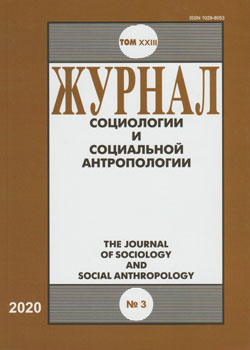Самообразование в механизмах профессиональной адаптации студентов московских гуманитарных вузов
Аннотация
Литература
Abramova M.A. (2010) Obrazovanie kak faktor sociokul'turnoj adaptacii uchashhejsja molodezhi k uslovijam sovremennyh transformacij [Education as a factor of socio-cultural adaptation of students to the conditions of modern transformations]. Voprosy obrazovanija [Educational Studies], 3: 195–213 (in Russian).
Bezjuljova G.V. (2008) Psihologo-pedagogicheskoe soprovozhdenie professional'noj adaptacii uchashhihsja i studentov [Psychological and pedagogical support of professional adaptation of students]. Moscow: NOU VPO Moskovskij psihologo-social'nyj institut (in Russian).
Billett S. (2010) The Perils of Confusing Lifelong Learning with Lifelong Education. International Journal of Lifelong Education, 29(4): 410?413.
Bondarenko N.V. (2018) Nepreryvnoe obrazovanie vzroslogo naselenija v Rossii: vovlechennost', istochniki finansirovanija i osnovnye jeffekty ot uchastija [Continuing adult education in Russia: involvement, sources of funding, and main effects of participation]. Informacionnyj bjulleten' [Information Bulletin], 12. Moscow: Nacional'nyj issledovatel'skij universitet «Vysshaja shkola jekonomiki» (in Russian).
Erstad O. (2015) Educating the Digital Generation. Nordic Journal of Digital Literacy, 5: 56–71.
Fossen F., Sorgner A. (2019) Mapping the Future of Occupations: Transformative and Destructive Effects of New Digital Technologies on Jobs. Foresight and STI Governance, 13(2): 10–18.
Gadamer H.-G. (2001) Education is Self-Education. Journal of Philosophy of Education. 35(4): 529–538.
Gotlib A.S. (2000) Social'no-jekonomicheskaja adaptacija rossijan: opyt sochetanija kolichestvennoj i kachestvennoj metodologii v odnom otdel'no vzjatom issledovanii [Socio-economic adaptation of Russians: experience of combining quantitative and qualitative methodology in a single study]. Sociologija: metodologija, metody, matematicheskoe modelirovanie (4M) [Sociology: Methodology, Methods, Mathematical Modeling], 12: 5–24 (in Russian).
Kitchin R. (2017) Bol'shie dannye, novye jepistemologii i smena paradigm [Big Data, new epistemologies and paradigm shifts]. Sociologija: metodologija, metody, matematicheskoe modelirovanie (4M) [Sociology: Methodology, Methods, Mathematical Modeling], 44: 111–152. (in Russian).
Kljucharev G.A., Kofanova E.N. (2016) Samoobrazovanie kak adaptacionnyj resurs [Self-Education as adaptation resources]. In: Gorshkov M.K. (ed.) Rossija reformirujushhajasja: Ezhegodnik [Russia is being reformed: Yearbook]. Moscow: Novyj hronograf: 282–308 (in Russian).
Korel L.V. (2005) Sociologija adaptacij: Voprosy teorii, metodologii i metodiki [Sociology of adaptations: Questions of theory, methodology and methodology.]. Novosibirsk: Nauka (in Russian).
Kozyreva P.M. (2004) Processy adaptacii i jevoljucija social'nogo samochuvstvija rossijan na rubezhe XX-XXI vekov [Adaptation processes and evolution of social well-being of Russians at the turn of the XX-XXI centuries]. Moscow: Centr obshhechelovecheskih cennostej (in Russian).
Monteiro A., Leite C., Rocha C. (2019) Students' self-study time and its relationship with a lifelong learning profile. European Journal of Curriculum Studies, 5(1): 753–768.
Pinchuk A.N. (2019) Konstruirovanie social'noj real'nosti v tehnosocial'nom prostranstve: novye voprosy i idei [Constructing social reality in the techno-social space: new questions and ideas]. Znanie. Ponimanie. Umenie [Knowledge. Understanding. Skill], 1: 131–141 (in Russian).
Pohoata G., Mocanu M. (2015) Students’ Self-Education, Guidance and Counselling. Euromentor Journal, VI(3): 43–53.
Rossiya 2025: ot kadrov k talantam [Russia 2025: From Cadres to Talents] (2017) The Boston Consulting Group [https://www.bcg.com/ru-ru/perspectives/188095 ] [accessed: 28.03.20] (in Russian).
Sagitova R. (2014) Students’ Self-education: Learning to Learn Across the Lifespan. Procedia — Social and Behavioral Sciences, 152: 272–277.
Shala A. (2016) Formal and Non-Formal Education in the New Era. Action Researcher in Education, 7: 119–130.
Smirnov V.A. (2015) Novye kompetencii sociologa v epohu bol'shih dannyh [Sociologist`s new competences in the times of «big data»]. Monitoring obshhestvennogo mnenija [Monitoring of Public Opinion: Economic and Social Changes Journal], 2: 44–54 (in Russian).
Tezaurus sociologii: temat. slov.-sprav. [Thesaurus of sociology: a thematic dictionary] (2009). Ed. by Z.T. Toshchenko. Moscow: YUNITI-DANA (in Russian).
The Future of Jobs Report (2018) Centre for the New Economy and Society. World Economic Forum [https://www.weforum.org/reports/the-future-of-jobs-report-2018 ] (дата посещения: 28.03.20).
Tolstova J.N. (2015) Sociologija i komp'juternye tehnologii [Sociology and computer technology]. Sociologicheskie issledovanija [Sociological Research], 8: 3–13 (in Russian).






